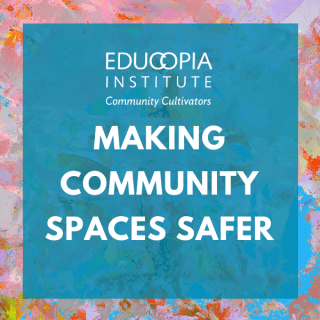
July 15, 2020
Making Community Spaces Safer: On Being Community-Driven
By Jess Farrell, Katherine Skinner, Hannah Ballard, and Caitlin Perry on behalf of the Educopia teamOver the course of 2020-2021, members of the Educopia staff will be contributing blog posts to the “Making Community Spaces Safer” series. Each post will explore one of our organizational values and describe our efforts to live into that value, including our successes, our failures, and the hard-won lessons that occur in between. We will announce new posts on the Educopia website and on Twitter.
At Educopia, we believe that communities should be member-owned and controlled, with the power to make their own strategic, operational, and financial decisions. Across our entire portfolio of work—from a grant cohort to an Educopia-hosted community—we empower our members and partners to take collective action to solve system-wide problems.
Our facilitation and assessment techniques intentionally center the needs of community members. We strive to create spaces—both physical and virtual—that encourage members to drive the conversation and set the agenda, while simultaneously connecting them with resources, tools, and external groups that help amplify and increase their impact.
Within any community hosted by Educopia, we aim to have governance bodies (not solo leaders) make community decisions. As facilitators, Educopia staff assist these governance bodies by assembling and maintaining scaffolding to guide and bolster their efforts.

For example, when a community’s governance structure is first being established or is in flux (e.g., in the Formation or Transition Lifecycle Stage as described in Community Cultivation—A Field Guide), Educopia staff facilitate that process. We provide a road map for the work, including timelines, milestones, and coordination. We also provide training, examples, and templates to support community members as they undertake this work, and we offer guidance regarding how to identify and correct gaps (e.g., a governance group that does not fairly represent the diversity of the community). Educopia staff are available to provide information and talk through any options or pathways the community is unsure about, but the community remains empowered to make its own decisions. Similarly, when a community’s finances and HR activities are in an Acceleration Lifecycle Stage, Educopia staff might guide its leadership through a process to help it set pricing, or help it to identify and secure new funding sources, but the community is entrusted to make its own decisions regarding its budget, pricing, and expenditures.
Educopia staff strive to provide the appropriate level of scaffolding at each stage of a community’s growth and maturation. At inflection points, particularly during the Formation or Transition Lifecycle Stages, an Educopia facilitator might take a more active role in helping the community build its norms and processes. When facilitators are asked to provide this more robust level of support, we remain conscious of the boundary between our roles and the community’s role. Educopia’s staff can serve as trainers, information generators, project managers, and mediators, but the community is always the decision-making body.
As a team, we reflect on our own work through regular evaluation processes. Our facilitators gather to share what they learn, and they work with our Research and Strategy group to capture vetted processes in our Community Cultivation Library so that we can reuse these over time. We also provide community members with opportunities to share feedback about their experiences with specific facilitators and the methodologies that we employ. And we do more than ask questions—we engage deeply with the feedback, reporting back to the community and acting on what we hear. At every stage, the community sits squarely in the driver’s seat.
Educopia’s commitment to collective action and community ownership guides all of our activities, from the approaches to community facilitation outlined above to our internal culture and ethos.